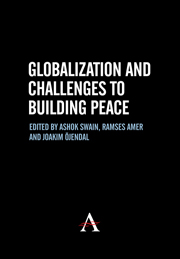Book contents
- Frontmatter
- Contents
- Acknowledgements
- List of Contributors
- 1 Building Peace in the Era of Three Waves
- 2 The Problem of Peace: Understanding the ‘Liberal Peace’
- 3 Pre-emptive Self-defence New Legal Principle or Political Action?
- 4 Beyond Criminal Justice: Promoting the Rule of Law in Post-Conflict Societies
- 5 Peace by Pact: Data on the Implementation of Peace Agreements
- 6 Refugee Repatriation as a Necessary Condition for Peace
- 7 Catapulting Conflicts or Propelling Peace: Diasporas and Civil Wars
- 8 UN Peace Operations as Norm Entrepreneurs: The Challenge of Achieving Communicative Action on Human Rights
- 9 To Practice What They Preach: International Transitional Administrations and the Paradox of Norm Promotion
- 10 Re-examining the Roots of War in West Africa in a Globalizing World
- 11 The African Union (AU) and Its Commitment to Non-Indifference: Can the AU be an Actor for the Promotion of Human Security?
- 12 Hamas Between Sharia Rule and Demo-Islam
- 13 Environmental Scarcity and Intrastate Conflicts: The Case of Nepal
- 14 Narcotics: The New Security Threat for China
- References
- Bibliography
11 - The African Union (AU) and Its Commitment to Non-Indifference: Can the AU be an Actor for the Promotion of Human Security?
Published online by Cambridge University Press: 05 March 2012
- Frontmatter
- Contents
- Acknowledgements
- List of Contributors
- 1 Building Peace in the Era of Three Waves
- 2 The Problem of Peace: Understanding the ‘Liberal Peace’
- 3 Pre-emptive Self-defence New Legal Principle or Political Action?
- 4 Beyond Criminal Justice: Promoting the Rule of Law in Post-Conflict Societies
- 5 Peace by Pact: Data on the Implementation of Peace Agreements
- 6 Refugee Repatriation as a Necessary Condition for Peace
- 7 Catapulting Conflicts or Propelling Peace: Diasporas and Civil Wars
- 8 UN Peace Operations as Norm Entrepreneurs: The Challenge of Achieving Communicative Action on Human Rights
- 9 To Practice What They Preach: International Transitional Administrations and the Paradox of Norm Promotion
- 10 Re-examining the Roots of War in West Africa in a Globalizing World
- 11 The African Union (AU) and Its Commitment to Non-Indifference: Can the AU be an Actor for the Promotion of Human Security?
- 12 Hamas Between Sharia Rule and Demo-Islam
- 13 Environmental Scarcity and Intrastate Conflicts: The Case of Nepal
- 14 Narcotics: The New Security Threat for China
- References
- Bibliography
Summary
The development of a new AU peace and security architecture attracts much interest today from academic and policy communities alike. Various organizations, not least the UN, are zealously debating the nature of such institutional structures and what best role external actors can play to support and bolster them. Many interesting changes are underway with regards to African security sector reform, combating terrorism and small arms proliferation as well as early warning frameworks. I will focus specifically on one aspect – peacekeeping and peacebuilding capabilities, where there has been a prominent change in emphasis from the Organization of African Unity (OAU) to the AU. Before the end of the cold war the OAU had started putting human beings more and more at the centre of their management of peace and security issues. I provide a broad account of how the OAU was severely constrained in doing so. The AU, since its succession to the OAU in 2002, has continued this transformation in concerns and priorities. As well as elucidating and explaining some background factors to why the AU has started couching its conflict resolution mechanisms in human security language, I analyse to what extent the AU can be an actor for the promotion of human rights and human security. This increasing importance can be seen in many ways but I will focus specifically on the cases of the African Union peace missions in Darfur, Sudan and in Burundi.
- Type
- Chapter
- Information
- Globalization and Challenges to Building Peace , pp. 181 - 194Publisher: Anthem PressPrint publication year: 2007



